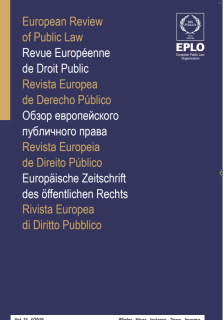
Unequal Representation of Stakeholders
in the Commission’s Impact Assessment Process
and the Protection of the Decision-Making Process
Dr, Lecturer in Law, School of Law, University of Essex, UK
Participation of interest groups in the Commission’s decision-making process is a vital part of EU policy-making. Nonetheless, some interest groups are overrepresented during this process due to their resources and information capabilities. As a result, they are capable of exerting considerable influence on the Commission’s decision-making process. This problem is particularly severe during the impact assessment process where interest groups submit information through stakeholders’ consultations. They also request access to impact assessment documents in order to know the information held by the Commission during the preparation of a legislative proposal. Against this background, the issue is whether unequal representation of stakeholders during the impact assessment process undermines the Commission’s decision-making process, thus justifying the Commission to refuse access to impact assessment documents (Article 4(3), Regulation No 1049/2001). In ClientEarth (C-57/16) the Court of Justice rejected this argument, however this article argues that in the absence of countervailing information, overrepresentation of stakeholders is capable of compromising the Commission’s decision-making process and the Commission may therefore justifiably prevent overrepresented stakeholders from accessing impact assessment documents.
La participation des groupes d’intérêt au processus décisionnel de la Commission est un élément essentiel de l’élaboration des politiques de l’UE. Néanmoins, certains groupes d’intérêt sont surreprésentés dans ce processus en raison de leurs ressources et de leurs capacités d’information. En conséquence, ils sont capables d’exercer une influence considérable sur le processus décisionnel de la Commission. Ce problème est particulièrement grave au cours du processus d’analyse d’impact, où les groupes d’intérêt soumettent des informations dans le cadre de consultations des parties prenantes. Ils demandent également l’accès aux documents d’analyse d’impact afin de connaître les informations détenues par la Commission lors de la préparation d’une proposition législative. Dans ce contexte, la question est de savoir si la représentation inégale des parties prenantes au cours du processus d’analyse d’impact compromet le processus décisionnel de la Commission, justifiant ainsi que la Commission refuse l’accès aux documents d’analyse d’impact (article 4, paragraphe 3, du règlement 1049/2001). Dans l’affaire ClientEarth (C-57/16), la Cour de justice a rejeté cet argument, mais cet article fait valoir qu’en l’absence d’informations compensatoires, la surreprésentation des parties prenantes est susceptible de compromettre le processus décisionnel de la Commission et que celle-ci peut donc à juste titre empêcher les parties prenantes surreprésentées d’accéder aux documents d’analyse d’impact.
* I wish to thank Professors Maurice Sunkin QC and Theodore Konstadinides for their comments. Any errors are exclusively mine.





















